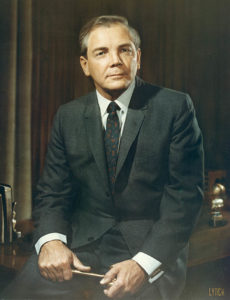John J. McKeithen
John J. McKeithen, the 49th governor of Louisiana, served from 1964 to 1972.

Courtesy of State Library of Louisiana
Official Portrait of Governor John J. McKeithen. Unknown
Democrat John McKeithen was the first twentieth-century Louisiana governor to serve two consecutive terms, between 1964 and 1972. Elected with the folksy plea “Won’t you he’p me?,” McKeithen combined the qualities and goals of a reform governor with those of a populist Longite. He attracted businesses and industries to Louisiana, and supported the construction of the Superdome for New Orleans’s newly minted National Football League franchise, the Saints.
Born in Grayson, near Columbia in Caldwell Parish, on May 28, 1918, John Julian McKeithen was the son of farmer Jesse J. McKeithen and DeEtte Eglin. He attended High Point College in North Carolina and Louisiana State University, where he received his law degree in 1942. He married Marjorie Howell Funderburk that same year. The couple had six children, including Walter Fox McKeithen, who served five terms as Louisiana Secretary of State. Also in 1942, McKeithen joined the US Army to serve as first lieutenant of the 77th Infantry Division in the Pacific Theater of Operations during World War II. He earned two Bronze Stars for his four years of service.
After the war, McKeithen returned to his family hometown of Columbia and began to practice law. In 1948 he was elected as a Louisiana state representative, and Gov. Earl Long appointed him floor leader, although he was previously only a relatively unknown country lawyer and politician. In 1952 he lost a race for lieutenant governor, and in 1954 he was elected to the Public Service Commission.
By the time he joined the gubernatorial race in 1963, McKeithen was still a relatively unlikely candidate to win. He voiced a populist plea to prove that even the son of poor farmers could rise to the highest political office in the state and was the first Louisiana politician to successfully use television in his campaign. In his commercials, he looked directly at the camera and asked voters “Won’t you he’p me?” The elision of the “l” was a mistake after a long day, but he soon turned the phrase into his signature campaign slogan.
McKeithen won the election and began his well-received, successful first term. Although his campaign had supported segregation, going so far as to accuse an opponent of working with the NAACP to discredit him, McKeithen was the first Louisiana governor to successfully begin integration. This change came in 1966, when he addressed a black audience and said, “I know I’m not leaving this state, and I don’t think you’re leaving either. So we’ve got to solve our problem.” By his final year as a governor, 200,000 children attended integrated public schools. McKeithen also called out the National Guard to protect civil rights activists as they marched from Bogalusa to Baton Rouge. His actions as governor prevented much of the potential violence that characterized similar events across the South.
McKeithen focused on attracting industry to the state. One of the ways he attempted this was through the construction of the Superdome, a project that was advocated by David Dixon, a plywood manufacturer and sports enthusiast. The New Orleans Saints had begun playing in the open-air Tulane Stadium in 1967, but the Superdome was designed as an enclosed and air-conditioned stadium, more appropriate for the hot and rainy New Orleans climate. The construction budget quickly ballooned from $35 million to $160 million. McKeithen arranged a feasibility study that endorsed the dome, convincing bankers to buy the bonds that financed it.
Government reform was another focus of McKeithen’s administration, and he improved the state code of ethics and extended civil service. He directed a constitutional amendment that allowed governors to serve two consecutive terms, and he then proceeded to run for a second term, winning by a landslide with 81 percent of the vote. His second term was less eventful, though marred by rumors after a series of articles in Life suggested that he had Mafia connections, but no official investigation or charges were ever made.
After eight years as governor, McKeithen retired to his farm in Columbia and continued practicing law. He was considered for vice president by Democratic nominee George McGovern in the 1972 election, but nothing came of this, perhaps because of his alleged ties to organized crime. He managed an oil and gas exploration company, and later opened a law practice in Baton Rouge, where he was a devout supporter of Louisiana State University. In 1983 he was appointed to the University’s Board of Supervisors. On June 4, 1999, McKeithen died in Columbia.
